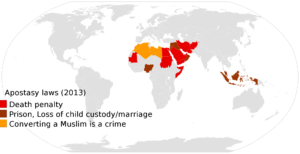
 Faith and Inheritance: A Case of a Vizier and Public Officials in 9th-Century Spain This month, Maribel Fierro examines a case concerning an accusation of apostasy during the reign of the Cordoban Umayyad emir Muḥammad (r. 238–273/852–886) from Ibn Ḥārith al-Khushanī’s collection of judicial anecdotes from al-Andalus. A jealous vizier, Hāshim b. ʿAbd al-ʿAzīz, “conspired to confiscate [the] fortune” of the emir’s secretary Qūmis b. Antunyān al-Naṣrānī after his death by accusing him of apostasy. Qūmis had converted to Islam from Christianity, but the vizier sought to prove in court that Qūmis had never converted. To do so, he “acted clandestinely through two different channels. On one end, Hāshim b. ʿAbd al-ʿAzīz got a muḥtasib (a layperson who served as a market inspector) to collect attestations of the deceased secretary’s apostasy and bring the case before the Cordoban judge, Sulaymān b. Aswad al-Ghāfiqī. At the same time, Hāshim b. ʿAbd al-ʿAzīz brought the case to the emir’s attention, advising the emir that he might have rights to the inheritance of Qūmis b. Antunyān, if it could be proven that Qūmis died a Christian.” The case was eventually brought to court, where the judge Sulaymān b. al-Aswad presided. The judge would not accept Hāshim’s attempt to manipulate the testimony and instead informed the emir that “the accusations against Qūmis were not verified and that those who had provided testimony against Qūmis could not be accepted as witnesses.” Hāshim’s fortune was thus distributed to his heirs. Fierro’s analysis of the case takes into consideration the role of witness selection and procedure in accusations pertaining to faith and the legal consequences that follow in medieval Islamic law. Read more. Image credit: Wikipedia
Faith and Inheritance: A Case of a Vizier and Public Officials in 9th-Century Spain This month, Maribel Fierro examines a case concerning an accusation of apostasy during the reign of the Cordoban Umayyad emir Muḥammad (r. 238–273/852–886) from Ibn Ḥārith al-Khushanī’s collection of judicial anecdotes from al-Andalus. A jealous vizier, Hāshim b. ʿAbd al-ʿAzīz, “conspired to confiscate [the] fortune” of the emir’s secretary Qūmis b. Antunyān al-Naṣrānī after his death by accusing him of apostasy. Qūmis had converted to Islam from Christianity, but the vizier sought to prove in court that Qūmis had never converted. To do so, he “acted clandestinely through two different channels. On one end, Hāshim b. ʿAbd al-ʿAzīz got a muḥtasib (a layperson who served as a market inspector) to collect attestations of the deceased secretary’s apostasy and bring the case before the Cordoban judge, Sulaymān b. Aswad al-Ghāfiqī. At the same time, Hāshim b. ʿAbd al-ʿAzīz brought the case to the emir’s attention, advising the emir that he might have rights to the inheritance of Qūmis b. Antunyān, if it could be proven that Qūmis died a Christian.” The case was eventually brought to court, where the judge Sulaymān b. al-Aswad presided. The judge would not accept Hāshim’s attempt to manipulate the testimony and instead informed the emir that “the accusations against Qūmis were not verified and that those who had provided testimony against Qūmis could not be accepted as witnesses.” Hāshim’s fortune was thus distributed to his heirs. Fierro’s analysis of the case takes into consideration the role of witness selection and procedure in accusations pertaining to faith and the legal consequences that follow in medieval Islamic law. Read more. Image credit: Wikipedia
 The Case of Asia Bibi : Apostasy, Public Opinion, and the Law The Asia Bibi case is one of the recent manifestations of blasphemy laws in Pakistan. The Applicant, Asia Bibi, a Christian woman, was sentenced to death by the trial court after allegedly uttering blasphemous statements against the Prophet Mohamed to fellow Muslim field workers. Student editor Aleema Jamal argues that Pakistan’s blasphemy laws and the public opinion that surrounds them creates a situation that makes it very difficult for those facing accusations to have a just legal proceeding. Read more. Image credit: Wikipedia
The Case of Asia Bibi : Apostasy, Public Opinion, and the Law The Asia Bibi case is one of the recent manifestations of blasphemy laws in Pakistan. The Applicant, Asia Bibi, a Christian woman, was sentenced to death by the trial court after allegedly uttering blasphemous statements against the Prophet Mohamed to fellow Muslim field workers. Student editor Aleema Jamal argues that Pakistan’s blasphemy laws and the public opinion that surrounds them creates a situation that makes it very difficult for those facing accusations to have a just legal proceeding. Read more. Image credit: Wikipedia
 Spotlight:: Asia Bibi v. The State & Another (Lahore High Court of Pakistan): A Blasphemy Conviction In a recent manifestation of Pakistani blasphemy laws and the miscarriages of justice that can result, Asia Bibi was a Christian woman, sentenced to death by a trial court in Pakistan after allegedly uttering blasphemous statements against the Prophet Muḥammad to her fellow Muslim workers. Despite serious questions about the quality of her defense and the truthfulness of the allegations against her, her conviction stood as the Lahore High Court dismissed her appeal. Read more. Image credit: Times of Islamabad
Spotlight:: Asia Bibi v. The State & Another (Lahore High Court of Pakistan): A Blasphemy Conviction In a recent manifestation of Pakistani blasphemy laws and the miscarriages of justice that can result, Asia Bibi was a Christian woman, sentenced to death by a trial court in Pakistan after allegedly uttering blasphemous statements against the Prophet Muḥammad to her fellow Muslim workers. Despite serious questions about the quality of her defense and the truthfulness of the allegations against her, her conviction stood as the Lahore High Court dismissed her appeal. Read more. Image credit: Times of Islamabad
See the full newsletter.

